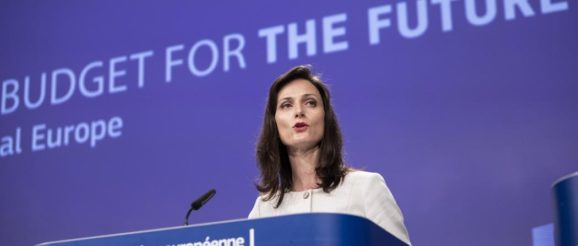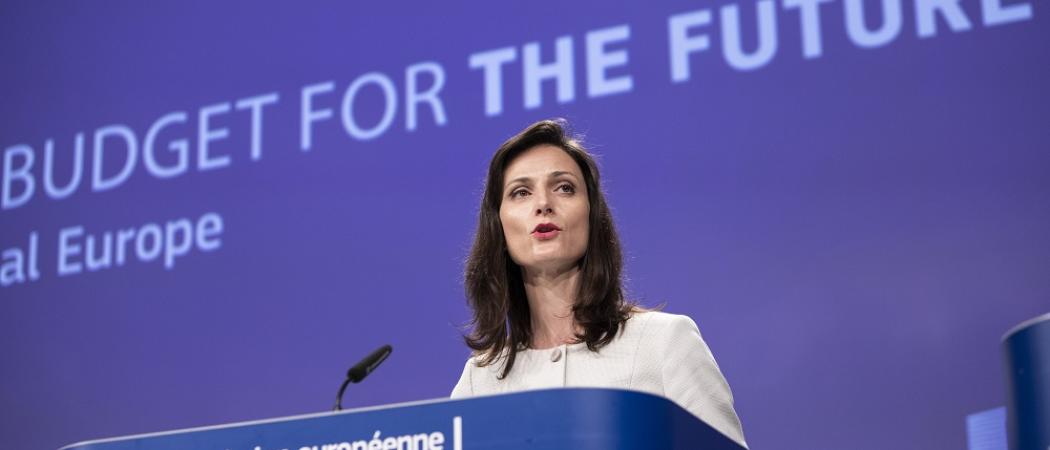Friend to bees and techies: a closer look at the EU’s new research and innovation chief


Photo: European Commission
The choice of Bulgarian politician Mariya Gabriel to replace research commissioner Carlos Moedas has seen the science establishment rushing to take a crash course on her background, experience and influences.
The question of what and who the 40-year old Bulgarian represents is given added urgency by the fact that the word ‘research’ has been stripped from the title, and Gabriel is to be appointed commissioner for Innovation and Youth.
Gabriel obviously knows her way around the workings of the commission, having served as the EU’s digital economy and society commissioner for the past two years. A member of the European Peoples’ Party, she swept through her parliamentary hearing unscathed in 2017, and was handed a mandate to complete the digital single market, one of the most wide-reaching policy arenas in Brussels.
But to the extent that she had crafted a professional persona since then, it is an inconsistent one, evading easy categorisation.
She is perhaps better known from her time as an MEP, between 2009 and 2017, when she hosted special advocacy events for bees.
“Bees give a unique service to the entire mankind,” Gabriel once said. Pollinators are “a gift of nature” that “we need to cherish.”
Back home in Bulgaria, Gabriel’s appointment is seen as a great opportunity to put the country’s research and technology strengths in the shop window.
The expectation is that she “will give greater visibility to new innovation and research players, and put a stronger emphasis on the fairer distribution of EU research money,” said Karina Angelieva, Bulgaria’s deputy minister of education and science.
In Sofia University, the hope too is that Gabriel would bring to the job an appreciation of the needs and wishes of the EU’s newest and poorer members.
“I am convinced Maria Gabriel will help to overcome the differences in the opportunities for researchers between the regions of Europe,” said Anastas Gerdzhikov, rector of Sofia University. “She already stated that she wants central and eastern Europe to obtain a decent place in the (2021-2027) Horizon Europe research programme, and that she will work for the active involvement of [central and eastern] researchers and companies in the programme.”
Hard working
During her stint as digital commissioner, Gabriel has won a reputation for hard work among colleagues.
“She wants to know everything, and takes herself everywhere, from the big cities to the small villages. When she starts something, she has to finish it. She’s a super hard worker from early morning to very late at night. You need to run to keep up with her,” said Angelieva.
But there are also many who say Gabriel has never fully mastered the digital brief, and see her accomplishments mainly in non-legislative issues, such as promoting digital skills, media literacy and gender equality.
Critics say Gabriel’s public utterances are rote, sticking closely to commission talking points. She is a presence on Twitter, but not a kinetic one.
Gabriel: the CV
Born in 1979 in Gotse Delchev, a town in southwestern Bulgaria, situated beneath the jagged Pirin Mountains, Gabriel graduated in Bulgarian and French languages at the nearby Plovdiv University in 2001. She continued her studies at the Academy for Political Science in Bordeaux, graduating with a master’s degree in international relations. Gabriel then worked as a teaching and research assistant in Bordeaux until 2008. One year later, she was elected to the European Parliament.
“She definitely struggled to make her mark in her portfolio,” said Alberto Alemanno, Jean Monnet professor of European Union law and regulation at HEC Paris. “She wasn’t capable to shape and lead a proactive agenda aimed at stamping some governmental authority over the major tech platforms.”
Germany’s Julia Reda, an MEP from 2014 to May 2019, says her impression is that Gabriel is, “very loyal to her party and to the commission, and follows their line dutifully even when their policies are objectively awful.”
In parliament, Reda was a fierce opponent of a controversial overhaul of EU copyright rules, elements of which fell under Gabriel’s brief. In Gabriel’s new portfolio, Reda suggests that, “Academics can convince her to do the right thing when there is no clear political guidance from the hierarchy.”
Some commentators say Gabriel found herself with an impossible brief, trying to reconcile efforts to make the EU a global tech leader with the need to confront online excesses like fake news and curb the power of the big technology companies.
“Undoubtedly the mood changed over the past few years, with more of an appetite to tackle the behaviour of the global tech giants,” said Angela Mills Wade, executive director of the European Publishers Council. “This is partly as their dominance has grown exponentially, while concerns about their impact, not only on business, but on society and democracy, has grown.”
Confidante of Bulgaria’s prime minister
Depending on who you ask, “You will receive polarised comments” about Gabriel, said Radosveta Vassileva, legal scholar and teaching fellow at University College London. “That is because she is a personal favourite and a close confidante of prime minister Boyko Borissov, who has driven the country to ruins,” Vassilva said, citing Bulgaria’s low ranking in a range of indexes measuring transparency, free press, foreign direct investment and median incomes.
“I personally found it ironic she was given this portfolio considering Bulgaria is last in the commission’s digital performance index,” added Vassileva, who runs a blog with commentary on Bulgarian politics.
Gabriel’s supporters counter that criticism of her handling of the digital brief is overdone. “The negative commentary on Gabriel in her digital current job, taken mid-mandate, are most unfair,” said Robert Madelin, former director general of DG Connect, who is now chairman of Fipra International, one of Brussels’ largest consultancies.
Madelin predicts she will be a success in her new brief, because she has already been in the inner circle laying the ground for Horizon Europe, “and is therefore well placed to carry the ball over the line on that key legislative and budget end game,” he said. “Her excellent French connections will stand her in good stead [too].”
Allies and admirers point to Gabriel’s expert command of French. She completed her studies in France, and worked there before coming to Brussels. Her office declined a request for an interview.
The current director-general of DG Connect, Roberto Viola, who worked under Gabriel, describes the Bulgarian as “talented and energetic”.
“Commissioner Gabriel has successfully led EU policies in high performance computing, artificial intelligence and quantum technologies. She has worked a lot to give access to young talented students to better training opportunities, by enhancing the international dimension and fighting very hard for more women in tech,” Viola said.
Parliamentarians, who see her as one of their own, are similarly protective. “Gabriel was my number one pick in the lottery,” Christian Ehler, German MEP and one of two lead draftsmen from the parliament on Horizon Europe legislation, said.
Her agenda
In addition to Horizon Europe, Gabriel’s sprawling portfolio will absorb education duties currently performed by commissioner Tibor Navracsics.
“There are so many areas she can put her own stamp on,” said Angelieva. “The ball is rolling already on Horizon Europe, but she has a chance to kick it in the goal. The money debates are coming.”
How the EU allots its 2021-2027 budget will be hashed out over months — debated, amended and approved by the leaders of the member states and by parliament, too.
“Gabriel has to fight for Horizon and Erasmus, and I think the beauty of her [integrated] portfolio is that she’s not fighting an education commissioner for resources,” said Angelieva.
Still, government officials and research lobbyists envisage a desperate fight to secure a spending increase for research, from €77-odd billion today up to €94 billion from 2021. The EU budget will have to deal with a significant reduction in funds given the UK’s intention to leave and stop paying into its budget after a transition period that will end in December 2020.
It may fall to Gabriel to manage the expectations of researchers who cheered a proposed hike in research spending last year. The loss of the word research from the title of her brief is considered an early handicap, with policy heads fearing its absence could spell less emphasis on science.
The Bulgarian is also taking over the innovation brief at a time when voices are clamouring against the growing power of internet players.
Political support is steadily growing in Brussels for the smaller companies up against giant search engines, app stores, online market platforms, and social media networks, said Wade. “I feel we are moving away from a period of disruption, to a moment of reckoning.”
East-west tug-of-war
The hope when any new research chief is appointed is that they won’t tinker with stuff people agree works well, such as the European Research Council.
However, some research insiders feel that with the arrival of Gabriel comes a strong possibility that the east-west argument on Horizon Europe will be reopened.
Europe’s dominant R&D players – Germany, France, UK, the Netherlands, the Nordics – see their overriding mission as boosting European science, technology and competitiveness; and they have helped structure the Horizon programmes to that end.
By contrast, many east European countries – such as Slovakia, Romania, Poland and Hungary – see at least some role for EU research programmes in addressing systemic issues, such as pay gaps, the brain drain and opening up western project consortia. Collectively, the 13 mostly eastern countries that joined the EU since 2004 get just 4.8 per cent of total Framework funding – yet they represent 17 per cent of the EU population.
Angelieva suggests Gabriel should start by looking at widening access to the European Institute of Innovation and Technology for more central and eastern universities and companies.
But watching Gabriel’s moves closely will be those officials who warn against the use of the EU research programme as a means of transferring money from richer states to poorer ones.
The EU’s commitment to aiding development of its newer and poorer members comes primarily via large regional support funding, although the Horizon Europe programme also has a “widening excellence” component intended to bootstrap research capacity in poorer countries.
“Widening will certainly be a topic high on Gabriel’s agenda, but this would also be the case if she was not coming from eastern Europe,” said former director-general of the Commission’s DG Research, Robert-Jan Smits, who is now president of Eindhoven University of Technology.
Slovenian Janez Potočnik, the EU research commissioner from 2004 to 2010, knows plenty about the political pressures and histrionics Gabriel will have to cope with.
“I do not know her well, but as much as I have worked with her I have developed quite good impressions of her potential,” he said.
“She will likely better understand the needs and the problems of the eastern countries, and could also act based on that knowledge, but she will be commissioner for all the countries, tasked to make European research, including from the east, excellent, useful, and competitive – like all of us who were ever in her position,” Potočnik said.
“The fact that she likes bees and campaigns for their welfare is just additional point speaking in her favour,” he added.
